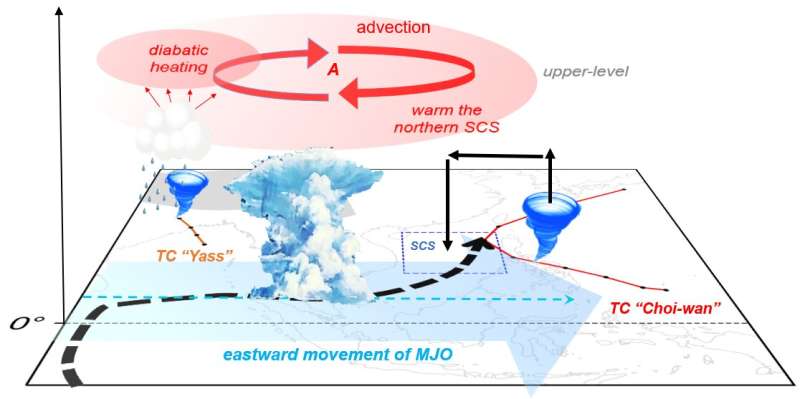Indo-Pacific Ocean warming increases the uncertainty in forecasting the onset of the South China Sea summer monsoon

The onset of the South China Sea summer monsoon (SCSSM), usually characterized by a simultaneous circulation–convection transition, marks the beginning of the East Asian summer rainy season. Thus, forecasting it at the subseasonal-to-seasonal scale is a key concern. On the basis of previous findings, the El Niño–Southern Oscillation (ENSO) signal in winter is regarded as the most important predictor for SCSSM onset. Furthermore, research shows that western Pacific warming has advanced the SCSSM onset time since 1994.
However, in the last decade, predictions of SCSSM onset based on the ENSO signal in winter often failed; plus, the onset of the SCSSM has been happening relatively later, despite the observed sea surface temperature in the equatorial western Pacific continuing to warm.
Now, a joint research effort by Nanjing University of Information Science & Technology, the Chinese Academy of Meteorological Sciences, Peking University, and the South China Sea Institute of Oceanology, Chinese Academy of Sciences, has revealed that the recent warming in the Indo-western Pacific Ocean region under global warming has increased the uncertainty in forecasting the onset of the SCSSM.
Frequent occurrence of cold-tongue La Niña events and Northwest Indian Ocean warming have weakened the impacts of ENSO on SCSSM onset and delayed the start of the SCSSM. Additionally, they have favored more high-frequency, propagating moist convective activities, further increasing the uncertainty in predicting the onset of the SCSSM.
Most recently, in 2021, the onset of the SCSSM was late following a cold-tongue La Niña-like event in the previous winter characterized by apparent circulation–convection inconsistency. Specifically, the circulation transition was 12 days earlier than the development of convection.
“Our results mainly attribute the circulation–convection inconsistency to the activities of TC [tropical cyclone] Yass in the Bay of Bengal and TC Choi-wan in the western Pacific, both of which were modulated by the MJO [Madden–Julian Oscillation],” explains Dr. Ning Jiang, corresponding author of the study. “Besides, its predictability was directly limited by the initial signal of the MJO in the prediction model.”
Under global warming, the rapid warming of sea surface temperature over the Indo-western Pacific may increase the influence of high-frequency processes, challenging our ability to forecast the onset of the SCSSM at the subseasonal-to-seasonal scale. In the past decade, uncertainty in the reliance on ENSO in predicting the onset of the SCSSM has increased. This study suggests that skillful prediction of the MJO during late spring may provide an opportunity to accurately predict the establishment of the SCSSM several weeks in advance.
The findings have been published in Advances in Atmospheric Sciences.
More information:
Yanying Chen et al, Influences of MJO-induced Tropical Cyclones on the Circulation-Convection Inconsistency for the 2021 South China Sea Summer Monsoon Onset, Advances in Atmospheric Sciences (2022). DOI: 10.1007/s00376-022-2103-5
Citation:
Indo-Pacific Ocean warming increases the uncertainty in forecasting the onset of the South China Sea summer monsoon (2022, December 14)
retrieved 14 December 2022
from https://phys.org/news/2022-12-indo-pacific-ocean-uncertainty-onset-south.html
This document is subject to copyright. Apart from any fair dealing for the purpose of private study or research, no
part may be reproduced without the written permission. The content is provided for information purposes only.
For all the latest Science News Click Here
For the latest news and updates, follow us on Google News.

